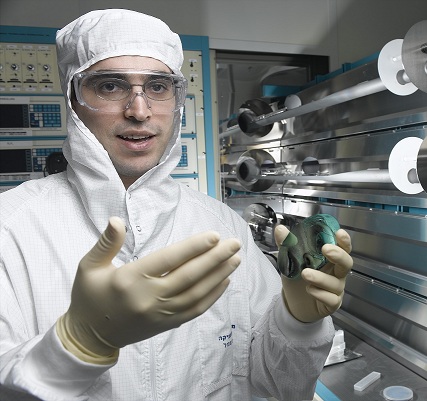The Technion researchers discovered that the "electronic nose" they developed knows how to distinguish between molecules found in the mouthwash of head and neck cancer patients and molecules found in the breath of healthy people. The proof-of-feasibility study was published in the British Journal of Cancer.

The Technion researchers discovered that the "electronic nose" they developed knows how to distinguish between molecules found in the mouthwash of head and neck cancer patients and molecules found in the breath of healthy people. The proof-of-feasibility study was published in the British Journal of Cancer.
Technion researchers collected breath samples from 82 people from three groups: head and neck cancer patients, lung cancer patients and healthy subjects. They examined the differences between the molecules found in the oral cavity among the three groups, using a unique test equipment known as the "electronic nose", which was developed in the research laboratories of Professor Hussam Hayek in the Faculty of Chemical Engineering at the Technion.
The "electronic nose" was able to distinguish between molecules found in the breath of head and neck cancer patients and molecules found in breath samples of healthy subjects. The "nose" also distinguished between lung cancer patients and healthy subjects, and between lung cancer patients and head and neck cancer patients.
About 37,000 people are diagnosed with head and neck cancer in the US every year. This category encompasses different types of tumors in the tissues of the head and neck, for example in the salivary glands and nasal mucosa. In many cases, head and neck cancer is diagnosed late, due to the lack of specific symptoms. This disease often causes secondary tumors that affect the respiratory system, including the lungs.
Professor Hussam Haik, who leads the research, said that "the development of new ways to diagnose head and neck cancer is a vital need. The diagnostic process is complicated, requires tests by specialist doctors, and in many cases occurs at a late stage of the disease. We found clear differences between groups of molecules found in the breath of patients and the molecules in the breath of healthy subjects, using a simple and early breath test. Now we have to examine these results in broader studies, and check if they can be used as a basis for an effective testing method in the context of head and neck cancer."
Dr. Leslie Walker, Director of Information at the British Cancer Research Centre, said: "It is possible that these interesting preliminary findings will lead to the development of a dedicated artificial "nose" that will enable the detection of these types of cancerous tumors based on a breath test. Cancer Research UK is leading initiatives to improve the early diagnosis of cancer. It is very important that we can detect the disease as early as possible, because then it is easier to treat it and thus increase the survival rate. This research provides a new opportunity for the development of diagnostic methods for head and neck cancer, which is currently diagnosed in many cases at a late stage of the disease."

One response
Well done Hossam Hayek, and Sakhtein for the professorship!
Hope you are the next Nobel Prize winner!
Don't let them say that only the Jews win!
Good Day
Sabdarmish Yehuda